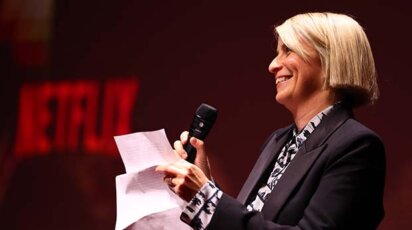News
Reunion 2021: Class of 2009 on Social Justice
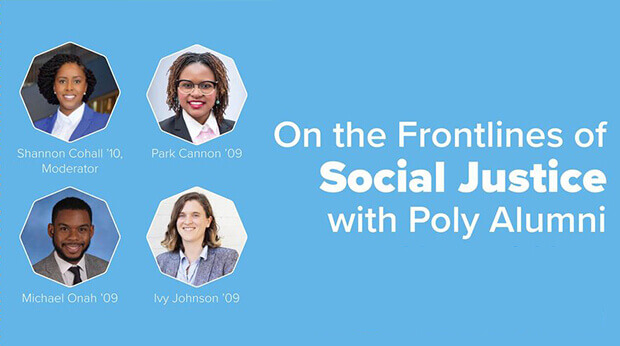
As part of Poly’s first Virtual Reunion, the Board of Governors Social Justice Initiatives (SJI) Committee invited alumni and the wider community to a panel discussion on May 13 with Poly alumni whose career paths focus on social justice and activism.
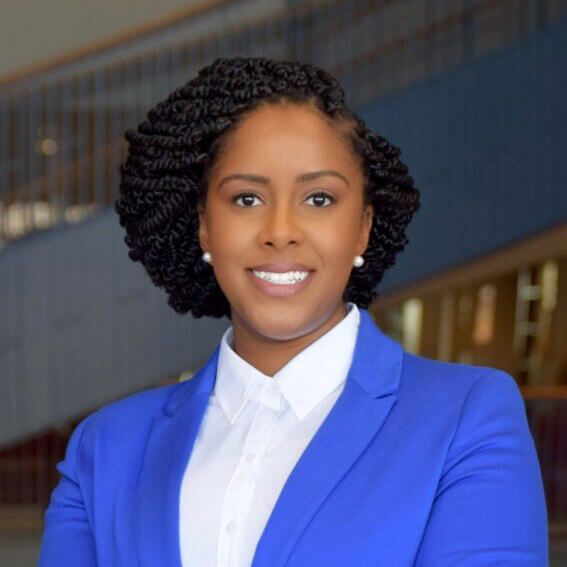
Shannon Cohall ’10 served as moderator. Cohall is a rising third-year law student at Rutgers Law School. She received her MPH from Washington University in St. Louis and completed her undergraduate studies at Cornell University in 2014. Currently, she serves as the President for the Association of Black Law Students at Rutgers, a Research Fellow for the Center for Law, Inequality, and Metropolitan Equity; Secretary for the Cornell Black Alumni Association.
Meet the Panel
Jonathon Beckles ’09, of the BOG SJI Committee, welcomed attendees and introduced the panel: Park Cannon ’09, Ivy Johnson ’09, and Michael Onah ’09.
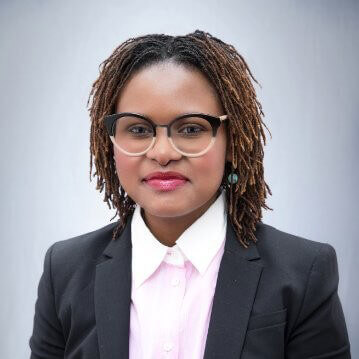
Park Cannon ’09 is the youngest member of the Georgia House of Representatives, Secretary of the Georgia Legislative Black Caucus, Chair of the Civil and Human Rights Committee, and Co-Chair of Communications. Cannon serves on the Insurance and Small Business Development House Committees, City of Atlanta Delegation, Fulton County Delegation, Bi-partisan Future Caucus, and is the secretary for the Women’s Caucus.
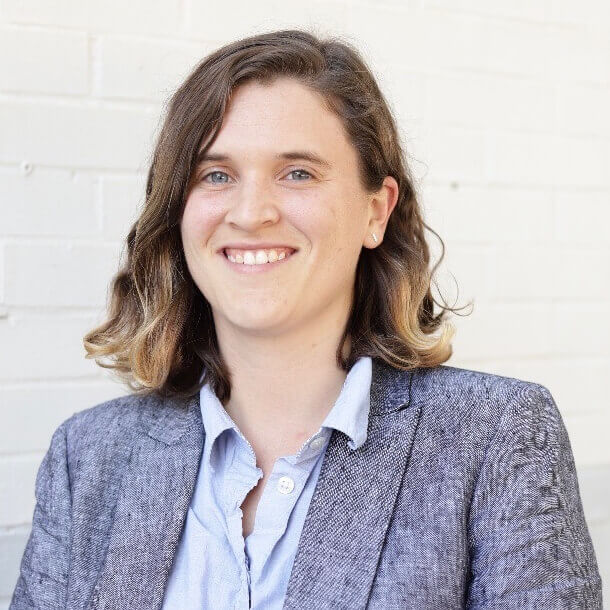
Ivy Johnson ‘09 works at the Center for Death Penalty Litigation in Durham, NC where she represents individuals on North Carolina’s death row. Prior to that, she was a civil rights litigator at the Southern Coalition for Social Justice where she litigated prison conditions cases, police accountability cases, and voting rights cases, with a focus on decriminalizing the ballot box. Johnson also worked for the North Carolina Justice Center where she focused on efforts to end cash bail and pass legislation expanding expunction eligibility to make the transition from incarceration back into society less burdensome.
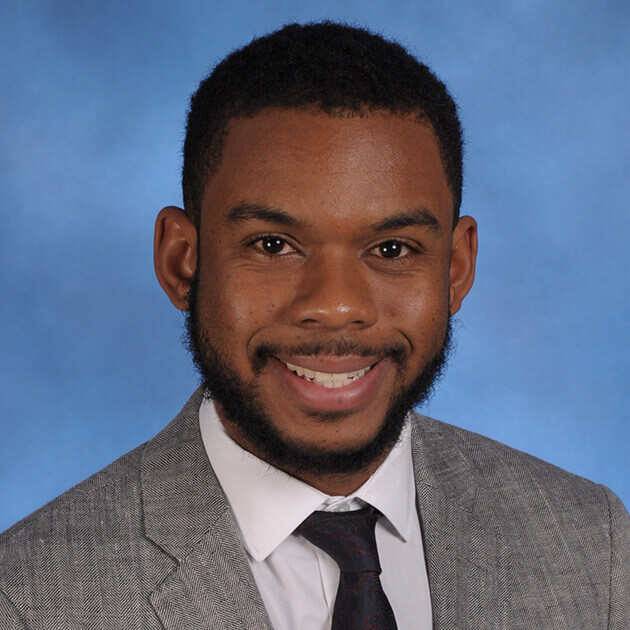
Michael Onah ‘09 is an associate attorney at Phillips Black, Inc., where he represents incarcerated individuals who seek to challenge their convictions and death sentences in state and federal appellate courts across the country. He focuses on post-conviction cases in Texas, California, and Pennsylvania. He is also a volunteer attorney with New Sanctuary Coalition, assisting undocumented immigrants applying for asylum.
Discussion of Current Social Justice Work
In opening the discussion, Shannon Cohall said it was “good to be part of Virtual Reunion.” She began with Park Cannon, who said she was named after an actress and people would be surprised that as a member of the House of Representatives of Georgia, she still holds “three other jobs: dance teacher, nanny, and labor doula.”
Ivy Johnson told Cohall she was encouraged to see this year that the state of Virginia had abolished the death penalty. North Carolina, the very conservative state where she works, has a moratorium on the death penalty. Johnson recalled that history teacher Harry Bernieri ’85, P’15, ’19 had her class read A People’s History of the United States by Howard Zinn in his class, which she still has and which was “pretty important to me to learn about social justice issues.”
“A shout out to all our history teachers at Poly,” Cohall said.
Park explained that she grew up in Georgia, but went to Poly and returned to Georgia. She said the first time she ever voted was for Grace Brahimy ’09 for class president. Park noted, “I have been in the news for doing my job,” alluding to being arrested in the State Capitol for knocking on a door during a bill signing. The main issues she is concerned with are voting rights and reproductive rights.
“Poly was a part of me just wanting to speak up for people,” Park added.
“My education included a lot of great teachers,” said Michael Onah ‘09. “The thing that sticks with me the most is my friends,” including Johnson, who has had a similar career path and interests.
“Where do you get your social justice information from?” Cohall asked the panel.
“From the internet,” replied Onah. “From websites, blogs. I go to them to learn about the issues.” He also cited The Marshall Project website and a community of lawyers on Twitter.
“The internet can be a good and terrible place at the same time.”
Johnson said her partner is a journalist. Johnson does not look to Twitter, but does check out Instagram and “people whose values and opinions I value.” She added, “The internet can be a good and terrible place at the same time.” She stressed the need for fact-checking sources of information. “I cannot stress how important that is.”
Cohall asked Cannon what advice she would give for those seeking facts. “Go to organizations that you trust,” Cannon said. “Some issues are not new issues. Look backward. I look to talk to people who have voted for 40 years.”
Challenges Panelists Face in Their Work
Cohall asked the panel what challenges they face in their work. “A lot of deadlines,” said Cannon. “I wish more people would be at the table and lead on the issues.” The Georgia House of Representatives is only in session 40 days in the year, she added. With a $27 million budget, “we have not funded education.” Prison is among the top items in the budget, she said.
Johnson said that a challenge for her is other people’s perceptions of her work on behalf of prisoners and their questions such as “Why are you representing these people?” Even if people are not innocent, they are “still a person,” she said.
Onah noted that he would like to see more diversity in the legal profession, noting 85% of lawyers are white and more than 60% are men, serving Black and brown people.
Coping with “Activist Fatigue”
“How do you deal with ‘activist fatigue’ and balance work with life?” Cohall asked the panel.
“I don’t always pretend I’m OK,” said Cannon. Constituents “want validation,” she said. “They have issues and [they think] you have a solution. But with issues such as unemployment, our office does not have the answer. We don’t always have the answers.”
Johnson said she tries to get exercise and tries to be honest about feelings. One Friday a month, she meets with a group about restorative justice.
“Allow yourself to realize this past year was not normal,” added Onah.
In responding to a question from Beckles about how they respond to bigger issues, Johnson said she tries to “personalize issues” such as “the worst thing you have ever done” and ask others to do the same.
Cannon said that in 2015 she decided to run for office. She wondered why there are so many “polarizing conversations about voting” and noted that some voters, such as her great aunt, have suffered “trauma informed voting” after having the experience of being put off the voting rolls.
Looking Back at Time at Poly
Finally, Cohall asked the panel if there is anything they wished they knew or had done earlier or when they were at Poly. Onah said he wished he had been more outspoken and found his voice earlier.
Johnson added, “It’s OK to be 16 and not know what you want to do.”
Cannon said she wished in high school she “could have taken more time in the library just reading a book.”
Afterward, Johnson said, “I was surprised with how engaged the audience members were. Of course, the panel took place over Zoom so the forum was limited, but it was exciting to see people nodding along and reacting to everything the panelists were saying.” Johnson added, “I felt particularly proud of my graduating class, the Class of 2009. That the panelists and organizers were all members of the same class makes me think something was going right while we were all at Poly!”
“I’d love to see more panels,” said Johnson. “I think sticking with the broader ‘social justice’ theme would be great and there are so many topics that fall under that umbrella. I’d be especially interested in environmental justice or housing crisis themed panels. I think it’s important to acknowledge these issues are all intersectional and you can’t really focus on one without discussing the others.”
Cohall added, “I was extremely proud of my fellow Poly alumni, who are bravely using their positions of privilege to serve various communities in need. Although Poly is not a perfect institution, it has taught us the importance of finding your passion and using your skills to make the world a better place.”
Cohall said she would welcome more such events in the future. “Virtual events allow alumni from all over the country to reconnect, network, and engage,” she said. “I like the idea of having courageous conversations about social justice and equity issues.”

